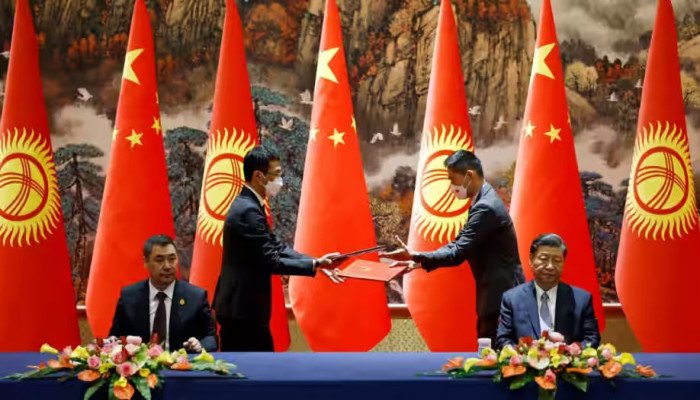Central Asian nations forge strong ties with China as Xi Jinping offers 'enduring' friendship
- In Reports
- 11:19 AM, May 19, 2023
- Myind Staff
On Thursday, the leaders of Central Asia gathered in the ancient Chinese city of Xian to meet with Chinese President Xi Jinping one-on-one to formally declare their "enduring" friendship. This helped pave the way for a conference that is anticipated to produce a regional agreement with Beijing.
The bilateral talks will set the stage for a group meeting on Friday, the first in-person gathering of the six leaders, where Xi will deliver an “important” speech and an “important” political document will be signed, China’s foreign ministry has said.
Across the Silk Road city of Xian, banners, billboards, and even taxi signs were set up to promote the summit, with some in both Chinese and Russian.
China is stepping up its economic and political ties with the former Soviet republics as Russia devotes its last available resources to the conflict in Ukraine. From Tajikistan's desire for more "respect" from the Kremlin to Kazakhstan's refusal to recognize Russian-controlled districts in eastern Ukraine, some Central Asian nations are taking a stronger stance against Moscow.
The first head of state to arrive in Xian was President Kassym-Jomart Tokayev of Kazakhstan - China's largest trading partner in Central Asia.
"We have a common goal - to intensify bilateral relations," Tokayev told Xi.
"We are also united by the desire to strengthen regional and international security and cooperation," he added.
Following their meeting, Xi and Tokayev announced that their nations would forge an "enduring friendship" and share "weal and woe."
They also decided to strengthen their collaboration in the fields of oil and uranium, as well as to secure the safe and reliable functioning of the Kazakh segment of the China-Central Asia natural gas pipeline.
Tokayev’s deal with Xi will set the tone for the other bilateral meetings, where China will seek deeper cooperation with other Central Asia states in its quest to achieve greater food, energy, and national security.
Kyrgyzstan's President Sadyr Japarov expressed to Xi his desire to strengthen commercial, economic, and investment ties, noting that Kazakhstan had set the example of cooperation for future bilateral talks.
"There are no political disagreements or unresolved issues between our countries," Japarov said.
Two-way trade between China and Central Asia hit a record $70 billion last year, with Kazakhstan leading with $31 billion. Kyrgyzstan followed with $15.5 billion, Turkmenistan with $11.2 billion, Uzbekistan with $9.8 billion, and Tajikistan with $2 billion.
"We've been supporting exactly this type of integration between China and Central Asia," said Albert Park, chief economist at the Asian Development Bank.
"Under that framework, we're trying to reduce trade barriers among the countries, harmonize trading standards to promote better integration, and just more forums where government officials can talk and try to develop standards to promote more trade," Park told Reuters in Beijing.
Beijing's use of "economic coercion" in its dealings abroad is anticipated to be on the agenda of Xi's summit with the leaders of Central Asia, which will prominently coincide with a meeting of the Group of Seven leaders beginning on Friday in Japan.
Image source: Reuters







Comments